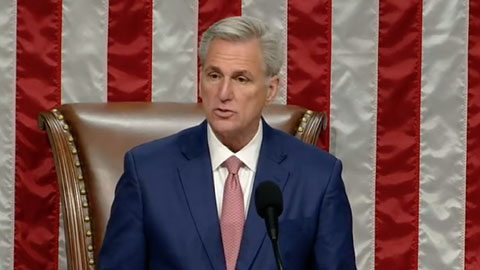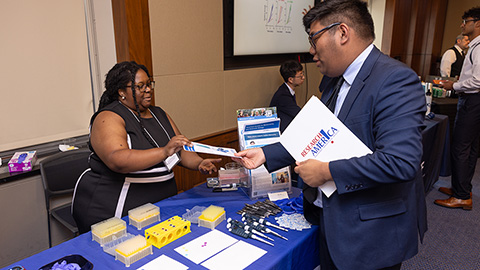ASBMB cautions against sacrificing science funds to make debt-ceiling deal
The American Society for Biochemistry and Molecular Biology released a statement this week calling on policymakers participating in debt-ceiling negotiations to preserve funding to major scientific agencies such as the National Institutes of Health, National Science Foundation and the Department of Energy.
In January, the United States reached its debt limit of $31.4 trillion. House Republicans are resisting raising the debt ceiling unless federal spending levels are reduced to fiscal year 2022 levels, which would reduce discretionary funding to the NIH, NSF and DOE by 22%.

A spending cut of that size would eliminate funding for 5,000 NIH grants and 31,000 NSF-supported and 5,200 DOE-supported researchers, according to the agencies.
Sarina Neote, public affairs director of the ASBMB, said the ASBMB strongly opposes reducing federal spending for science at this time and described the potential fallout as “devastating” to both the economy and scientific enterprise.
“Such cuts would negatively impact our 11,000 students, researchers, educators and industry professionals,” Neote said. “We have an obligation to do whatever we can to ensure that our members do not lose their funding or jobs.”
In the society’s statement, it argued: “This proposal would damage the U.S. research enterprise, weaken the nation's global leadership in science and technology, and threaten the scientists and students working tirelessly toward the next breakthroughs.”
Treasury Secretary Janet Yellen extended the deadline for negotiators to agree on a new debt limit to June. In the meantime, the ASBMB urged lawmakers to consider the impacts that spending cuts would have on the lives of scientists and their families.
“Each federal grant supports not just a principal investigator, but a whole lab made up of staff scientists, postdoctoral researchers, graduate students and even undergraduate trainees,” the society wrote. “Cutting each federal grant means multiple people will lose their livelihoods and training opportunities. We must not let this happen.”
Enjoy reading ASBMB Today?
Become a member to receive the print edition four times a year and the digital edition monthly.
Learn moreGet the latest from ASBMB Today
Enter your email address, and we’ll send you a weekly email with recent articles, interviews and more.
Latest in Policy
Policy highlights or most popular articles

Embrace your neurodivergence and flourish in college
This guide offers practical advice on setting yourself up for success — learn how to leverage campus resources, work with professors and embrace your strengths.

ASBMB honors Lawrence Tabak with public service award
He will deliver prerecorded remarks at the 2025 ASBMB Annual Meeting in Chicago.

Summer internships in an unpredictable funding environment
With the National Institutes of Health and other institutions canceling summer programs, many students are left scrambling for alternatives. If your program has been canceled or delayed, consider applying for other opportunities or taking a course.

Black excellence in biotech: Shaping the future of an industry
This Black History Month, we highlight the impact of DEI initiatives, trailblazing scientists and industry leaders working to create a more inclusive and scientific community. Discover how you can be part of the movement.

ASBMB releases statement on sustaining U.S. scientific leadership
The society encourages the executive and legislative branches of the U.S. government to continue their support of the nation’s leadership in science.

ASBMB and advocacy: What we accomplished in 2024
PAAC members met with policymakers to advocate for basic scientific research, connected some fellow members with funding opportunities and trained others to advocate for science.

